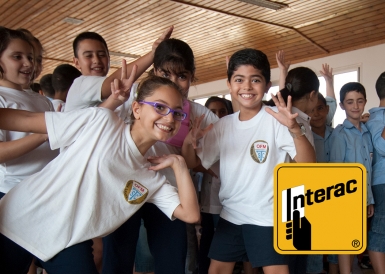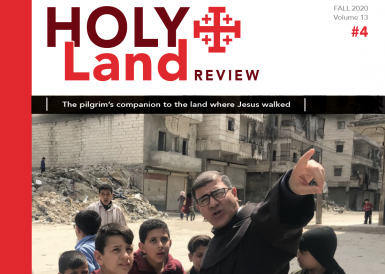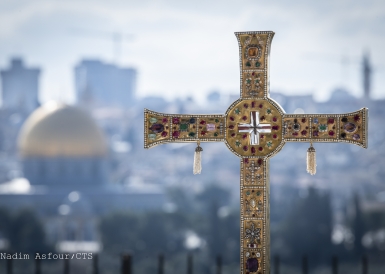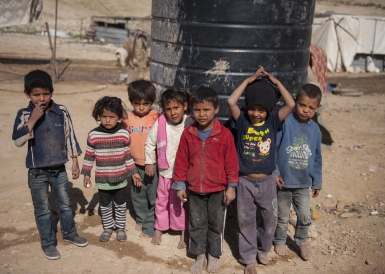WITH THANKS TO TERRESAINTE.NET
Palestine: The End of Pilgrimages is an Economic Disaster
Kassam Maadi
October 12, 2020
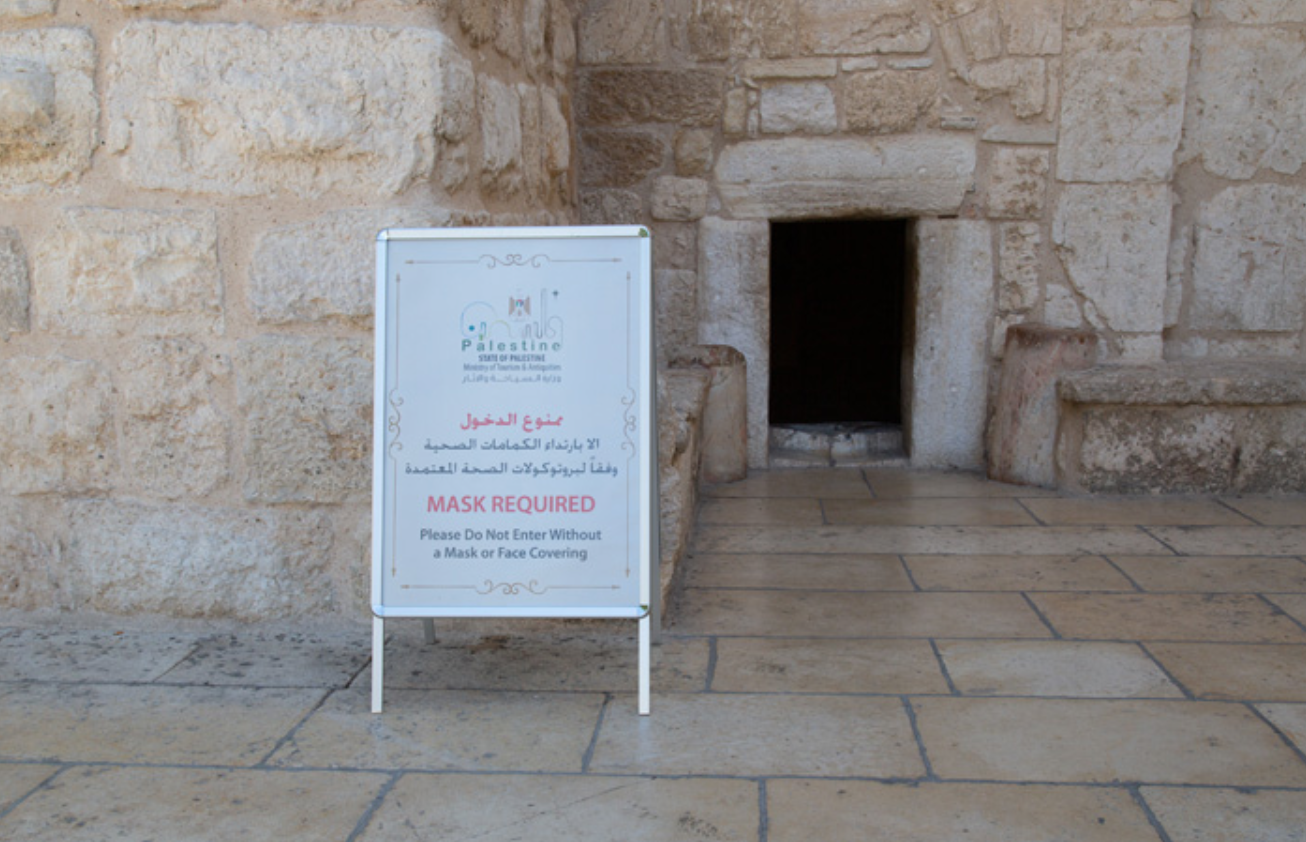
pandemic is located on a desperately empty forecourt. ©Andrea Krogmann.
Tourism and pilgrimages are the pillars of the Palestinian economy. Tony Khashram, President of the Association of Tourism Operators in Palestine, explains the consequences of the shutdown imposed since March by the closure of borders due to the Covid-19 pandemic. The Christian community is particularly affected.
Tourism and pilgrimages have been at a standstill since March. What are the financial consequences for this flagship industry of Palestine?
At the end of August, tourism losses in Palestine exceeded $320 million. This money makes up the salaries of all involved in tourism. In our association, the largest gathering of private tourism companies, all bookings have been cancelled. This means that all service providers, hotels, transport, shops, restaurants, guides have had no income since the end of February.
These figures are for Palestine, a country of fewer than six million inhabitants, where tourism is one of the main pillars of the economy. The current crisis is catastrophic. Its the worst in its history that Palestinian tourism has ever known.
During the intifadas [or, uprising], tourism and pilgrimages were already been affected. Why do you say that the current crisis is the worst in history?
Because, during the years of intifada, tourism and pilgrimages did not stop completely. At the beginning of 2000, for example, during the second intifada, there was an almost 90% drop in tourism. But in the following months, groups of pilgrims picked up again in small numbers. Those involved in tourism were able to survive. The airport remained open and there was always air traffic and travelers.
With the current crisis, we have seen a 100% drop in activity overnight, with no recovery so far. It is as if all the lawyers in the country were told one morning that they had to stop working; or the bakers, that they could not make any bread at all.
What is also different is that the intifadas only affected the Holy Land. Tourism continued in the rest of the world, and we just had to hold out for the movement. This time, the whole world has stopped, and it will take much longer to get back on track, to get into the very habit of travelling.
You told the Al-Hayat newspaper last June that the crisis is hitting tourism in Palestine at a time of growth. Does this have a particular impact?
Tourism in Palestine has grown significantly since 2017. By 2019 this growth had reached its peak. The tourism sector benefited from significant investments. Many hotels and guest houses have opened in all regions, with tens of thousands of rooms. Many people have asked for long-term loans from banks to invest in this development, and the banks have given loans unreservedly.
The onset of the crisis at this time of development is a major blow to investors; especially for those who have invested in small and medium-sized projects, such as guest houses and souvenir shops. In Bethlehem, for example, hundreds of merchants bought tons of souvenirs, both local and imported, for pilgrims. Some bought this merchandise on credit. Many families have turned part of their family home into a guest room by taking on debt.
You were talking about Bethlehem, is the Christian community particularly affected by the crisis?
Around 70% of Christians in Palestine work in tourism, either full-time or partially. Most tourist agencies are family businesses, as well as businesses related to pilgrimages. Pilgrimages really sustain the Christian presence in the Holy Land. My two sons, for example, are adults and work with me in our agency. If tourism does not pick up soon, they will go abroad to look for new opportunities. This is the case in many families.
But what is even more important is that the Christians of Palestine are the ones who, as local Christians, welcome the pilgrims. If Christians disappear from the area, in the future pilgrims will encounter only empty churches and dead stones.
What do you think should be done to save tourism in Palestine?
We need to prepare a comprehensive post-crisis marketing plan to attract tourists from all over the world to our country, and we need to start planning right now. The private sector cannot do it alone. The Palestinian government must step in to direct this effort. It is a question of promoting the country as a tourist destination, and that is the role of the public sector, the Ministry of Tourism.
This is a national emergency because tourism is a pillar of the Palestinian economy. If we do not prepare for the post-crisis situation now, the tourism that returns when the borders reopen will be picked up by Israeli agencies, which take advantage of Israeli control over the territory, the Holy Places and the sites.
What role can the churches play in this effort?
Churches have the ability to encourage pilgrims to visit the Holy Land, and they can do so now. The Pope can call for a pilgrimage to the Holy Land as soon as possible, and that would have an effect at the level of the local churches. Dioceses, the main organizers of pilgrimages, have direct links with parishes in the Holy Land and could concentrate their efforts on reviving pilgrimages, and this would encourage travel to Palestine. Slowly, this effect can influence and help revive other sectors of tourism.
But local churches in the Holy Land can also play a role. The various Patriarchates, the Bishops, the Custody of the Holy Land, can encourage pilgrims to travel by appealing to pilgrims’ solidarity with the living stones of the Church – the Christians of the Holy Land. This would be a similar appeal to that made to the churches following the second intifada.
When do you think tourism in Palestine will resume, and how?
Current conditions, especially since the beginning of the second wave of the virus, indicate that the end is not near. Tourism will not resume its growth until June 2021. It will take until September, at best, for tourism in Palestine to recover 25% of the strength it had in 2019. That would be enough to save the area, but we will have to wait. We are in a difficult time, but I am optimistic. Tourism cannot die.
The stats:
Tourism in Palestine accounts for 40% of bank transfers received from abroad. It generates nearly $1 billion and employs more than 32,000 Palestinians directly. Services such as hotels, restaurants, guides and transportation support 10,300 Palestinian families.
In 2019 more than 3.5 million tourists visited Palestine and hotels reached 70% occupancy rates. This growth encouraged new investment in the sector. Since 2018, more than 155,000 new rooms have been built. The drop in the number of tourists to zero, due to the pandemic, caused direct losses of $145 million in the hotel sector, $7.5 million for restaurants, and $85 million in debt for tourist bus owners. In total, losses in the tourism sector in Palestine exceeded $320 million in August.
About Tony Khashram
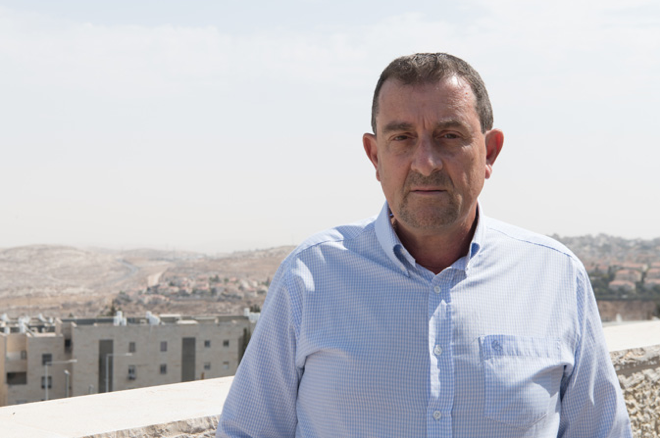 Tony Khashram is the founder and CEO of Aeolus Tours, a travel agency and tour operator for inbound and outbound tourism. He is also president of the Holy Land Incoming Tour Operators Association (HLITOA), a private sector association that represents 50 tour operators across Palestine. He is committed to supporting the economy and GDP of Palestinians by strengthening the tourism sector.
Tony Khashram is the founder and CEO of Aeolus Tours, a travel agency and tour operator for inbound and outbound tourism. He is also president of the Holy Land Incoming Tour Operators Association (HLITOA), a private sector association that represents 50 tour operators across Palestine. He is committed to supporting the economy and GDP of Palestinians by strengthening the tourism sector.
A committed Christian, he is also the vice-president of the local St. Vincent de Paul Conference known as the Holy Sepulchre and the President of the CCAO – Coordinating Catholic Aid Organizations – in Israel and Palestine, which brings together fifteen major Catholic humanitarian organizations.

